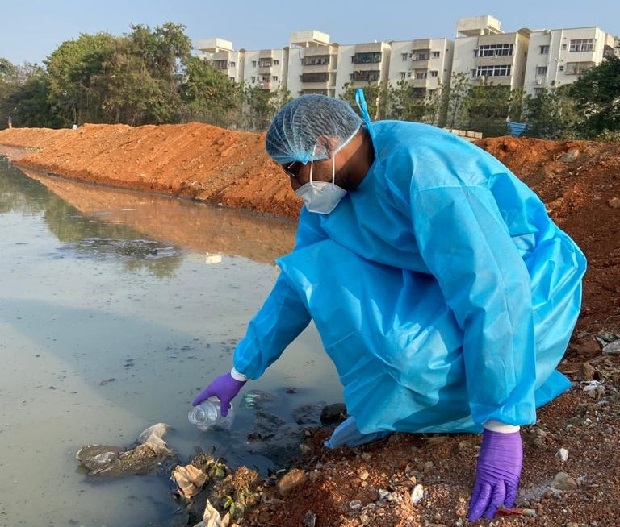July 20, 2023
Wastewater Surveillance: A Game-Changer for Public Health in India

Source: The Hindu
Introduction
- In the wake of a recent study published in The Lancet Global Health, wastewater surveillance has emerged as a powerful strategy for public health surveillance.
- This cost-effective approach has gained prominence in tracking diseases like poliovirus and SARS-CoV-2, presenting new opportunities for early outbreak detection and response.
- India, with its diverse healthcare landscape and challenges, stands to benefit significantly from incorporating wastewater surveillance into its public health infrastructure.
The Concept of Wastewater Surveillance
- Wastewater surveillance involves monitoring and analyzing wastewater samples to gather information about the presence and spread of disease-causing agents within a community.
- By systematically sampling and testing wastewater from various sources, such as sewage systems or wastewater ponds, specific markers or genetic fragments of pathogens can be identified in designated laboratories.
Benefits of Wastewater Surveillance
- Early Outbreak Detection: Wastewater surveillance enables the detection of disease-causing agents before clinical cases are reported, facilitating prompt response and containment measures.
- Community-Level Monitoring: Analyzing wastewater samples provides insights into overall community health, aiding in the identification of disease trends and targeted interventions.
- Cost-Effectiveness: Wastewater surveillance eliminates the need for individual samples, reducing costs associated with collection, testing, and analysis.
- Complementary to Clinical Data: Wastewater surveillance captures asymptomatic cases and enhances understanding of disease prevalence beyond clinical data, providing additional insights.
- Early Warning System: Wastewater samples containing specific genetic markers or pathogen fragments can serve as an alert for potential disease outbreaks.
- Surveillance in Resource-Limited Areas: Wastewater surveillance helps monitor disease occurrence in areas with limited access to healthcare facilities, enabling prioritized resource allocation.
- Evidence-Based Decision Making: Integrating wastewater surveillance data with other sources informs data-driven decisions for disease control, resource allocation, and targeted interventions.
Challenges in India’s Public Health Surveillance System
- Uneven Coverage: The public health surveillance system in India lacks uniform coverage, with rural and remote areas often facing limited infrastructure and resources for surveillance.
- Fragmented and Siloed Efforts: Disease surveillance in India is often fragmented and focused on specific diseases or health conditions, hindering comprehensive detection and response to emerging health threats.
- Inadequate Data Sharing: Challenges exist in sharing data between different levels of government and across departments, impeding the seamless flow of information necessary for early detection and response.
- Limited Diagnostic and Laboratory Capacity: India’s public health laboratory infrastructure and diagnostic capacity require significant improvements, including the provision of resources, equipment, and trained personnel for timely and accurate testing.
- Underreporting and Data Quality Issues: Underreporting of diseases and inconsistent data quality pose significant challenges in India’s public health surveillance system.
- Limited Use of Advanced Technologies: The adoption of advanced technologies, such as real-time data analytics, machine learning, and artificial intelligence, remains limited in India’s public health surveillance system.
Enhancing India’s Epidemiological Capabilities
- To enhance India’s epidemiological capabilities, the following steps can be taken:
- Incorporate Wastewater Surveillance into Reporting: Efforts should be made to incorporate wastewater surveillance data into existing surveillance reporting systems to ensure comprehensive and integrated disease monitoring.
- Integration with Ayushman Bharat Digital Mission: The Ayushman Bharat Digital Mission, which aims to create a seamless online platform for healthcare services, offers an opportunity to integrate wastewater surveillance into the national health agenda.
- Strengthen Public Health Laboratory Networks: By incorporating the testing of wastewater samples into surveillance reporting, public health laboratory networks can be strengthened through the provision of necessary resources, equipment, and trained personnel.
- Training of Public Health Professionals: Public health professionals should receive training in the management and interpretation of data derived from wastewater surveillance, in addition to traditional epidemiological methods.
- Data Management and Analysis: Develop robust data management systems to collect, store, and analyze wastewater surveillance data, either by creating dedicated databases or integrating it into existing surveillance information systems.
The Need for Political Backing and Adequate Funding
- To successfully integrate wastewater surveillance into India’s public health system, the following measures are essential:
- India’s Commitment to Public Health Surveillance: Political leaders must recognize the potential of wastewater surveillance as an effective tool for disease monitoring and response, building on India’s existing commitment to public health surveillance and resource mobilization.
- Niti Aayog’s Vision: The integration of wastewater surveillance aligns with Niti Aayog’s vision. Political leaders can provide strategic guidance and policy support to ensure its inclusion in the national public health agenda.
- International Platforms and Leadership: Leveraging India’s leadership at international platforms like the G20, political leaders can advocate for enhanced public health surveillance, secure international commitments and support, and elevate the significance of innovative approaches like wastewater surveillance.
- Resource Allocation: Adequate funding is crucial to implement wastewater surveillance effectively. Political leaders should allocate sufficient resources to build and strengthen laboratory networks, develop wastewater sampling infrastructure, and train public health professionals in data analysis and interpretation.
- Public-Private Partnerships: Facilitating partnerships between the public and private sectors can enhance funding for wastewater surveillance and foster collaboration in strengthening India’s public health infrastructure.
The Conclusion
- The inclusion of wastewater surveillance in India’s public health infrastructure holds great promise for disease prevention and control.
- With strategic leadership, India has the potential to set a precedent in integrated public health surveillance, prioritizing proactive measures, timely response, and a resilient healthcare system.
By embracing wastewater surveillance and addressing the challenges through political backing, adequate funding, and collaboration, India can significantly enhance its epidemiological capabilities and improve public health outcomes.
January 30, 2025
January 20, 2025
January 14, 2025
